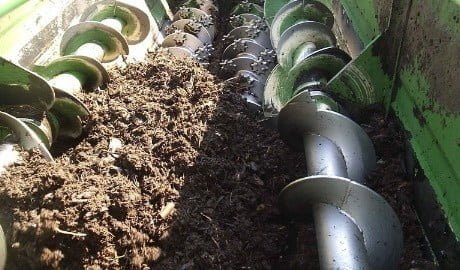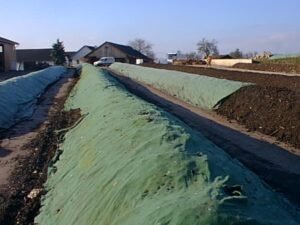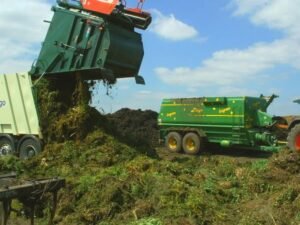The challenge of biodegradable waste treatment

A biodegradable material can be defined as a non-polluting material that can be decomposed by bacteria or other natural organisms. Examples are garden and park waste, food or kitchen scraps, forestry or agricultural waste, manure, sewage sludge, etc.
Different material textures and conditions such as solid, fibrous, moist, or wet represent major challenges for treatment. Various mechanical processing methods are necessary to break down and mix the different materials for the biological process.

Processing biomass with different physical characteristics is a common challenge in composting and biogas operations.
Aerobic or anaerobic fermentation processes need commonly volume reduction and conditioning of the ingredients. A homogenous input size with big surface area and open texture of all ingredients results in fast colonization with microorganisms and a faster degradation process.
Conditioning of input materials

Pre-shredding of coarse residues like untreated wood pallets, roots, trees, and bushes is commonly done with slow rotation shredders. Many agricultural products, like Beets, Carrots or Potatoes used in aerobic or anaerobic fermentation processes may be conditioned in this type of machines, too.
The processing of wood logs, forest residues, park and garden pruning is mostly done by means of fast rotation hammer mills or chippers.

Nitrogen rich ingredients like agricultural residues, grass clippings, plant cuts, food waste, manures or sludges need a different process step, because of their physical characteristics (moist or even wet) these may clog common shredding systems. Slow rotation auger type systems in a closed hopper or tank could be the best solution.
Adjusting the C/N Ratio & Humidity

In aerobic composting or anaerobic dry or wet fermentation processes for biogas production the correct C/N ratio (Carbon/Nitrogen ratio) is one of the most important parameters of the input mixture. Homogenously mixed ingredients accelerate the degradation process, reduce process times, and improve quality and yield.
The technical and economic feasibility of aerobic or anaerobic fermentation processes could be significantly improved with correctly conditioned and mixed compost or biogas substrates.
Bio-Mix-Shredders-A innovative Solution for Bio Waste Treatment

The ZAGO Green Division has developed an innovative solution for the treatment of all biodegradable residues from wooden materials over park and garden waste to manure and sludges.
ZAGO’s Bio Mix Shredders combine volume reduction, defibration and mixing of all ingredients in a single process step.
The Bio-Mix-Shredders in different hopper sizes and equipped with horizontal slow rotation (<30 RPM) auger systems are designed for a simultaneous mixing and shredding action of all inputs.
Different systems are available, according to specific needs and residues.
Related Information…










